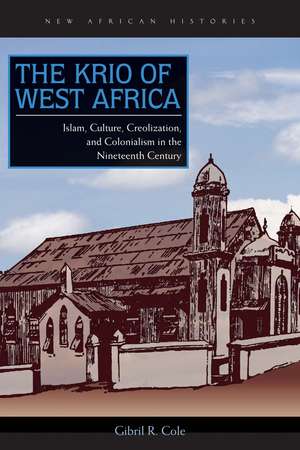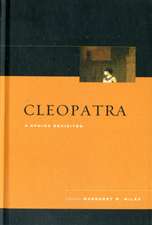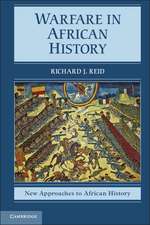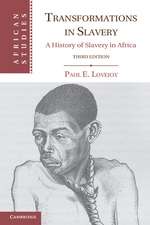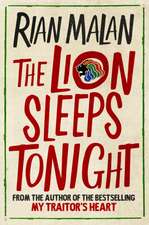The Krio of West Africa: Islam, Culture, Creolization, and Colonialism in the Nineteenth Century: New African Histories
Autor Gibril R. Coleen Limba Engleză Paperback – 14 sep 2013
Sierra Leone’s unique history, especially in the development and consolidation of British colonialism in West Africa, has made it an important site of historical investigation since the 1950s. Much of the scholarship produced in subsequent decades has focused on the “Krio,” descendants of freed slaves from the West Indies, North America, England, and other areas of West Africa, who settled Freetown, beginning in the late eighteenth century. Two foundational and enduring assumptions have characterized this historiography: the concepts of “Creole” and “Krio” are virtually interchangeable; and the community to which these terms apply was and is largely self-contained, Christian, and English in worldview.
In a bold challenge to the long-standing historiography on Sierra Leone, Gibril Cole carefully disentangles “Krio” from “Creole,” revealing the diversity and permeability of a community that included many who, in fact, were not Christian. In Cole’s persuasive and engaging analysis, Muslim settlers take center stage as critical actors in the dynamic growth of Freetown’s Krio society.
The Krio of West Africa represents the results of some of the first sustained historical research to be undertaken since the end of Sierra Leone’s brutal civil war. It speaks clearly and powerfully not only to those with an interest in the specific history of Sierra Leone, but to histories of Islam in West Africa, the British empire, the Black Atlantic, the Yoruban diaspora, and the slave trade and its aftermath.
In a bold challenge to the long-standing historiography on Sierra Leone, Gibril Cole carefully disentangles “Krio” from “Creole,” revealing the diversity and permeability of a community that included many who, in fact, were not Christian. In Cole’s persuasive and engaging analysis, Muslim settlers take center stage as critical actors in the dynamic growth of Freetown’s Krio society.
The Krio of West Africa represents the results of some of the first sustained historical research to be undertaken since the end of Sierra Leone’s brutal civil war. It speaks clearly and powerfully not only to those with an interest in the specific history of Sierra Leone, but to histories of Islam in West Africa, the British empire, the Black Atlantic, the Yoruban diaspora, and the slave trade and its aftermath.
Din seria New African Histories
-
 Preț: 251.88 lei
Preț: 251.88 lei - 19%
 Preț: 479.49 lei
Preț: 479.49 lei -
 Preț: 230.83 lei
Preț: 230.83 lei -
 Preț: 223.97 lei
Preț: 223.97 lei -
 Preț: 276.18 lei
Preț: 276.18 lei -
 Preț: 231.50 lei
Preț: 231.50 lei -
 Preț: 228.77 lei
Preț: 228.77 lei -
 Preț: 223.97 lei
Preț: 223.97 lei -
 Preț: 251.88 lei
Preț: 251.88 lei -
 Preț: 223.58 lei
Preț: 223.58 lei -
 Preț: 308.25 lei
Preț: 308.25 lei -
 Preț: 256.81 lei
Preț: 256.81 lei -
 Preț: 215.75 lei
Preț: 215.75 lei -
 Preț: 213.37 lei
Preț: 213.37 lei -
 Preț: 251.72 lei
Preț: 251.72 lei -
 Preț: 230.41 lei
Preț: 230.41 lei -
 Preț: 226.37 lei
Preț: 226.37 lei - 18%
 Preț: 187.01 lei
Preț: 187.01 lei -
 Preț: 230.41 lei
Preț: 230.41 lei -
 Preț: 252.71 lei
Preț: 252.71 lei -
 Preț: 278.09 lei
Preț: 278.09 lei -
 Preț: 280.34 lei
Preț: 280.34 lei -
 Preț: 294.80 lei
Preț: 294.80 lei -
 Preț: 275.98 lei
Preț: 275.98 lei -
 Preț: 293.04 lei
Preț: 293.04 lei -
 Preț: 273.85 lei
Preț: 273.85 lei -
 Preț: 272.32 lei
Preț: 272.32 lei -
 Preț: 292.83 lei
Preț: 292.83 lei -
 Preț: 258.32 lei
Preț: 258.32 lei -
 Preț: 274.27 lei
Preț: 274.27 lei -
 Preț: 280.05 lei
Preț: 280.05 lei - 23%
 Preț: 480.51 lei
Preț: 480.51 lei - 23%
 Preț: 477.86 lei
Preț: 477.86 lei -
 Preț: 257.94 lei
Preț: 257.94 lei - 23%
 Preț: 473.41 lei
Preț: 473.41 lei -
 Preț: 271.39 lei
Preț: 271.39 lei -
 Preț: 260.45 lei
Preț: 260.45 lei -
 Preț: 275.98 lei
Preț: 275.98 lei -
 Preț: 274.27 lei
Preț: 274.27 lei - 23%
 Preț: 472.21 lei
Preț: 472.21 lei - 23%
 Preț: 476.82 lei
Preț: 476.82 lei - 23%
 Preț: 475.64 lei
Preț: 475.64 lei
Preț: 272.70 lei
Nou
Puncte Express: 409
Preț estimativ în valută:
52.18€ • 54.68$ • 43.14£
52.18€ • 54.68$ • 43.14£
Carte tipărită la comandă
Livrare economică 12-26 aprilie
Preluare comenzi: 021 569.72.76
Specificații
ISBN-13: 9780821420478
ISBN-10: 082142047X
Pagini: 280
Dimensiuni: 152 x 229 x 25 mm
Greutate: 0.35 kg
Ediția:1
Editura: Ohio University Press
Colecția Ohio University Press
Seria New African Histories
ISBN-10: 082142047X
Pagini: 280
Dimensiuni: 152 x 229 x 25 mm
Greutate: 0.35 kg
Ediția:1
Editura: Ohio University Press
Colecția Ohio University Press
Seria New African Histories
Recenzii
“The Krio of West Africa: Islam, Culture, Creolization, and Colonialism in the Nineteenth Century, is an engaging history of Sierra Leone that departs from previous scholarship. Taking issue with those who have tended to describe the Krio as essentially a Christian and Westernized ‘ethnic group,’ [Cole] suggests that the Krio identity, forged in nineteenth-century Freetown, transcended ethnicity, culture, and even religion. Indeed, his study focuses not on Christians, but on the hitherto understudied Muslim Krios, a group he portrays as ‘marginalized within the marginalized’ … This informative book fills an important space on the shelves of Sierra Leonean history.”—American Historical Review
“…The Krio of West Africa is not only a long-overdue and welcome addition to the historical literature on Sierra Leone, but also a breath of fresh air for treating an important subject located in the longue durée of Sierra Leone’s past rather than privileging the aberration that much of the country’s postcolonial history has been. My prediction is that Cole’s monograph will become a benchmark for studying the complex histories of other indigenous ethnic groups of Sierra Leone.”—International Journal of African Historical Studies
“Cole’s book is an important contribution to the history of Krio and Sierra Leonean society. … It also contributes to our historical knowledge concerning the spread of Islam in West Africa and the Krio Muslims’ role in it.”—Comparativ
“Cole’s long awaited book… is an engaging history of Sierra Leone that departs from previous scholarship. Taking issue with those who have tended to describe the Krio as essentially a Christian and Westernized ‘ethnic group,’ he suggests that the Krio identity, forged in nineteenth-century Freetown, transcended ethnicity, culture, and even religion. …This informative book fills an important space on the shelves of Sierra Leonean history.”—American Historical Review
Notă biografică
Gibril R. Cole is an associate professor of history at Louisiana State University.
Descriere
Sierra Leone’s unique history, especially in the development and consolidation of British colonialism in West Africa, has made it an important site of historical investigation since the 1950s.
